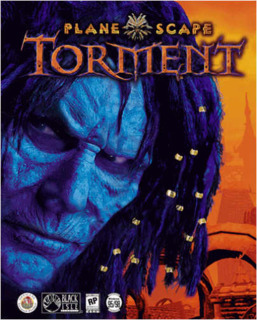Rarely are the experiences with a computer game like this put in the terms of the absolute; however, for the most part, games don't have that much to do with the absolute as it is because it generally doesn't have that much to do with anything, except, or course, if there is a lot of text in a game - and that's what's the case with this game. A lot of dialogue and generally extensive reading (sometimes with NPCs who cannot really be called human anymore, because they resemble books so much in the scope of what they can tell you about the Planescape as such for example) are what typifies this game.
Please do not get me wrong: I believe wholly that the game has problems. For one, it's old. It doesn't have very revolutionary mechanics. It doesn't provide a coherent blueprint for any future games, because it build extensively on earlier games instead of being truly innovative. So it doesn't even have any historical value. Nevertheless the entirety of the game has a certain character, which is amazing to see in its full development during the game. First of all, its story: it builds on a typical memento-narrative of finding out about the past through the snippets of fact you left behind yourself as you were engaged with yourself in the past, a constant circle of forgetting and rediscovering yourself. Secondly, it has oomph. That is to say it has, through its music and colourful locations, and the voice-acting and cut-scenes, sparse as they are, a real impression to make. Why not anything better than oomph? Well, because the strange thing about this game is that the story as it progresses becomes more and more long-winded also, as if I hadn't finished playing it yet when I started writing this review: that's true, I haven't quite finished yet. Don't know if I ever will...
All right, I will finish the game and then get back to you. But here's my conclusion ahead of time:
Games exist to be played, and this game can definitely be played. But it is mostly interesting as a final word on gaming, as a kind of argument against gaming in general, than as a true game. The textures and scenes of the game already convey the ambiguous meaning of the fact that this is a 'game' still, even though it has so much text to work through for its completion. There isn't truly any reason to continue gaming after this game is done. But then it is still more heroic to return to this game and complete it anyway!
Addition: 20-08-2018
Chris Avellone wrote this game. He is a very wise man. It is obvious that he is well at home with the big ideas hidden within the barrage of fantasmagorial enigmata of the Dungeon and Dragons universe. He worked hard at this game, and he works hard in his life, and his ascetic life-habits are well-documented. The writing is incredibly wordy, but that is no problem. The words make sense, and the characters are very interesting. He is a modern-day Seneca. Like Seneca, his philosophies revolve around the distinctions between ways of life, and so the question of the game "What can change the nature of man?" is reflected and in a way answered by the fabric of the game of itself.

